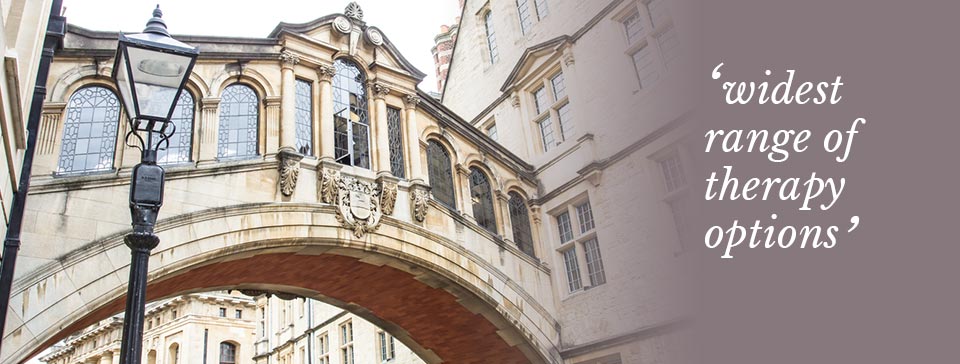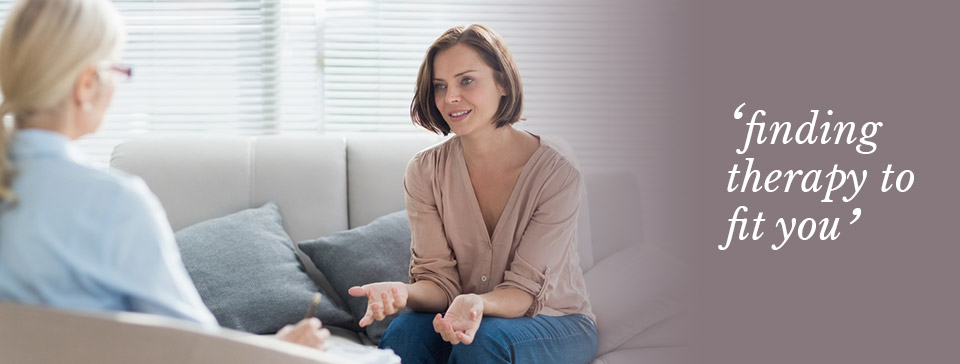Welcome to OTS-Oxford Therapy Centre
\
OTS is the largest community (around 100) of counsellors and psychotherapists offering therapy (including low cost) at this centre and across the Oxford region, and at our centres in Oxford and Witney. The senior therapists who help you find what you need, each have over 25 years experience, and have assessed thousands of clients over the decades to refer them to the right person. We offer a wide range of counselling and psychotherapy, as every person is unique - with different needs - even if you have the same 'labelled' problem (e.g. Depression).
Help to find the right counsellor/therapist for you
Low-cost counselling
Many people feel a sense not anxiety in enquiring about counselling or psychotherapy. Getting a good relationship with the right counsellor is so important in helping with this anxiety, that we have been offering therapy assessments and referrals for the past few decades. These sessions not only help us find you the right psychotherapist, but usually ease you worries and concerns about starting counselling, as well as prepare you to get the most out of it.
We also offer you lots of information about the counselling and psychotherapy services we offer on this website and on the main OTS website to help you make your own informed choice. Depending on the option that you choose, you may open a page on the main OTS website. This site will remain open in your browser for you to return to.
You can also phone us on 07977 126330 or email us if you would like an assessment and referral session which can help find the right practitioner for you in Oxford, Witney and across the region, as well as the low-cost service and group therapy provided by OTS at the centres in Witney & in Oxford.
Emails are usually responded to within 24-hours (48-hours during busy times)
Click here if you want counselling or psychotherapy
About OTS - the what, where, who & why
Trainee Placements
Free talks and events - for the public & practitioners
OTS Newsletter - if you would like to receive our infrequent newsletter you can subscribe by entering your email address on the right.
We have a comprehensive range of resources on our main OTS website to help individuals, couples and families with issues including depression, stress, anxiety, bereavement, eating disorders, gender and sexuality as well as links if you need urgent help and support.
Click here to see our resources
Options: what type of counselling or psychotherapy do you need?
There are hundreds of different types of counselling & psychotherapy (and psychological therapies in general), and you are unique - one person suffering with depression, anxiety or stress isn't the same as another person with depression, anxiety or stress. The challenges that couples and families face are also unique. Finding the right approach and more importantly the right counsellor or therapist or group for you is essential in meeting your particular needs.
Read through this list of options and then select one for further information:
Why do individuals, families or couples contact us?
Help to find the right counsellor/therapist for you
One-to-one counselling or psychotherapy
Group Therapy
Couples/relationship counselling
Child and family therapy
Low-cost counselling
Fees: Costs for different therapy options
About OTS-Oxford Therapy Centre
Why do individuals, families or couples contact us?
The reasons someone might feel they need to see a counsellor or psychotherapists are as unique and diverse as the individuals who seek one. It could be because of a diagnosed problem such as stress, depression, anxiety, addiction or difficulties with a relationship for example but it could also be a desire to improve our general mental and emotional wellbeing. Life presents us with many challenges and whether it is past or present emotional difficulties for you, in your relationship or family OTS can help to address these issues by referring you to one of the many different therapeutic approaches we offer. Having dedicated time and space to talk with a trained counsellor or psychotherapist in a safe and confidential environment can help you gain a better understanding of your feelings and behaviour and find less destructive and life-limiting coping mechanisms. Just as most of us take care of our physical health, counselling helps us to take care of our mental health and provides us with the tools and self-belief in order that we can manage more effectively in the future.
The resources on our main OTS website offer support across many of the wide range of difficulties people seek help with, but are by no means an exhaustive list!
Click here to see our resources
Help finding the best counselling/psychotherapy for you
As there are many different types of therapeutic approaches and different types of counsellors and psychotherapists, we can help you to the find the right therapist for you, your relationship or family. Anyone who has ever had counselling or psychotherapy is likely to agree that it is the relationship that develops between you and your counsellor or psychotherapist that is so important in how beneficial the therapy is. Our assessment and referral interviews will give you a chance to explore this; to say what you would like help with and what you want or need from therapy. Whether it is one-to-one therapy, couples or family therapy or group therapy that is the best option for you we can agree with you on a way forward. We are usually able to see you for an assessment within a week.
More info and request an asesssment/referral interview here
If you would like to see details of some of the fully qualified counsellors/therapist who we might refer you to click here. Please note there are many other practitioners who do not appear on our website.
One-to-one counselling or pychotherapy
At OTS we see all potential clients as individuals. You are unique, and your life challenges, how you cope with them and what type of therapy works for you will also be unique! Your counsellor or psychotherapist will also be unique in who they are and how they practice so if you decide individual therapy is right for you, we will help you to find someone who will work with you as an individual and provide the right amount of support and challenge for you. It may be that group therapy would be more effective and we will explore this in more detail also.
Click here for more on one-to-one counselling or psychotherapy
Group therapy
Joining a group of strangers can sound intimidating but has many potential benefits like:
Once you have overcome the very common initial anxiety that most people feel, group counselling or psychotherapy has been shown to be as, or more effective than individual therapy for many people. It is also often more affordable than one-to-one therapy.
Click here for more information on group therapy
Couples/relationship counselling
Just as we as individuals are unique, so are all our relationships. It is important for couples (gay, straight, bisexual or transgender) who may be looking for help with their relationship to explore whether therapy is right for them and which counsellor or psychotherapist they might work best with. Whether you are in a new relationship or one that is more long-term we can support you through major crises or help if you just feel generally dissatisfied with your partner or feel that you have “drifted apart”. You might also want help because you find it hard to be in or maintain a relationship. We recommend you have an assessment interview to discuss these issues.
Click here for more on couples/relationship counselling
Child and family therapy
At OTS we can offer some help in the field of child and family therapy but as most specialists work within the NHS we recommend you contact us to discuss your needs further.
Click here for more information on child/family therapy
Low-cost counselling
We are all aware of the huge difficulties people face accessing appropriate help and support from the NHS to be able to deal with whatever life challenges they are struggling with. We also know that for many people the typical cost of individual therapy sessions with experienced counsellors can be too much. This is why people turn to organisations like OTS and is why one of our key aims is to make counselling more accessible and affordable. Whether this be via group therapy, (which for many people is as effective as individual therapy), or our low-cost service mainly staffed by trainees on placement with us. An assessment/referral interview will help us to assess whether this option is suitable for you.
Click here for more information on low-cost counselling
Fees: Costs for different therapy options
Fees for an assessment and referral interview and any counselling or psychotherapy that is then recommended varies depending on a range of factors. Group therapy tends to be charged on a sliding scale, counselling for individuals depends on the practitioner you see, and couples therapy is generally charged at a higher rate. How much you can afford is obviously an important part of the assessment/referral interview, but we have provided an indication of the costs of the different therapy options we offer.
Click here for more information on costs for therapy options
About OTS-Oxford Oxford Therapy Centre
'we have the widest range of therapy options and can find the right counsellor or psychotherapist for you, your relationship or your family’
The OTS-Oxford Therapy Centre opened in 2018 to provide a thriving counselling and therapy community for Oxford, Witney and the surrounding areas. The centre has 2 group rooms and 3 individual therapy rooms, all providing a comfortable and relaxing environment for individual, group or family therapy. If you are looking for counselling or psychotherapy in Oxford, we offer assessments in Oxford and Witney, and can refer you to one of our practitioners who work at different venues across the region. We also have low-cost practitioners on placement with us, who work at our two centres and in Jericho at the Community Centre, and in Botley at The Oxford Community Health Hub.
As well as our new centre in Oxford our other therapy centre is in central Witney, just around the corner from the main bus stops at the top of the High Street. We are well placed for people travelling from Abingdon, Burford, Bampton, Carterton, Eynsham, Faringdon, Oxford, Wantage and other surrounding towns and villages.
If you are a practitioner and are interested in therapy room hire at our centres in Oxford or Witney, please see details on ‘Room Hire’ tab. If you would like to join our growing network and community of excellence see details via the 'Joining OTS' tab.
We regularly post interesting articles and events on our Facebook and LinkedIn pages
Click here to like/visit us on Facebook



